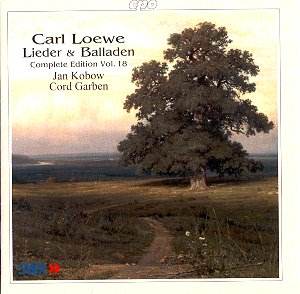This
major project by CPO to create a complete recorded edition of
Loewe’s vocal works reaches volume 18 with this issue.
Loewe
is an important figure in the German song (lieder) repertory.
Practically an exact contemporary of Schubert (he was born the
previous year), we tend to think of him as a composer of the next
generation, because he lived a normal life span, until 1869.
Loewe
wrote in excess of 500 lieder, as well as all manner of instrumental
and choral compositions, though it is for his solo vocal works
that he is remembered. The fact that this CPO issue of collected
songs is labelled ‘Volume 18’ tells its own tale.
The
constant factor in this series is the pianist Cord Garben, and
in partnership with his tenor soloist he proves an accomplished
and sensitive accompanist, ever alert to the possibilities of
a particular song, while ready with eager support for the singer.
Unlike some other issues in the series, this one has just one
singer: the tenor Jan Kobow. He is vocally secure and artistically
sensitive throughout, but to be frank, an hour of one voice in
this repertoire, in a recording if not in a live performance,
is a little too much of a good thing. In fact it is unlikely that
a lieder recital would feature an hour of songs by Loewe, all
sung by the same artist.
Now
this implied criticism – of lack of variety – is a little unfair,
since on CD the listener can select and reselect the programme.
Yet that itself raises the most important consideration of all
for the serious collector of lieder. With future listening in
mind, how easy will it be to find a particular song.
I
do wonder, as I have already observed when reviewing previous
issues in the series, whether a more chronological approach, made
by opus number, would have been wiser. For the collector wishing
to find that particular song, these compilations represent a challenge
of detective work, even if the themes do make sense and the artistic
balances offer a satisfying listening experience.
This
CPO project remains a major undertaking featuring a large corpus
of songs, and it is a undoubtedly a significant achievement. Loewe
was inspired by many poetic sources, and it is possible to argue
that he is at his best when he is most direct, laying emphasis
on a straighforward and song-like melodic line. In fact this happens
much of the time, which is one reason why individual songs work
so well as self-standing examples of his art; as an example try
the final song in this sequence: Das Schifflein (The Little Boat).
One
of the most interesting things about Loewe is the sheer range
of ideas that influenced him. The most remarkable example from
this programme is undoubtedly Paria, a three-part Indian legend
that interested Goethe. In three parts, the central section is
the most substantial at more than fourteen minutes, so it is a
tribute to the sensitivity and artistry of these musicians that
their performance sustains its length in terms of concentration.
The theme is as ambitious as we might expect, given the source:
a corpse can be brought back to life, but due to a misunderstanding
the chosen one combines the virtues of a goddess and the vices
of a criminal. Given these imageries, it is as well that Loewe
is a master of the narrative ballad.
However,
this extended treatment is exceptional, and most of the songs
are of shorter dimensions, standing well on their own as examples
of the new romantic song style.
Another
consideration for the music lover is that any of these CPO discs
will be worth acquiring individually, since the programmes are
so well planned, involving the artists and in particular, Cord
Garben, in the decisions. Therefore the pacing and balance of
each recorded recital on each individual disc, makes it worth
hearing in its own right. In that sense this particular CD is
perhaps less appealing than some of the others that offer the
easy contrasts that come via a mixture of voices. Having said
that, this remains a collection that is well worth our time and
attention.
Terry
Barfoot
